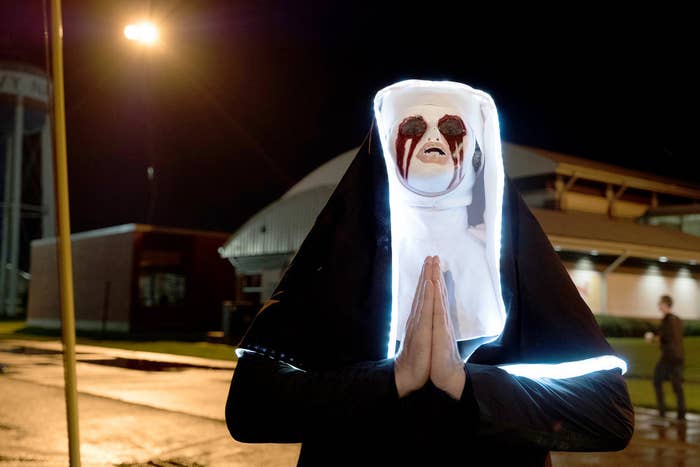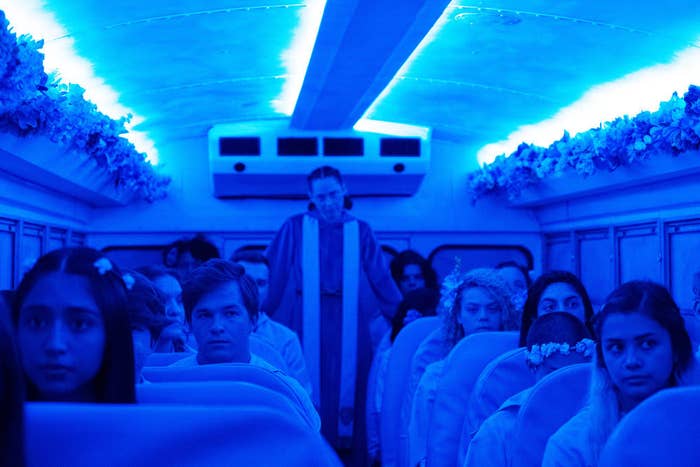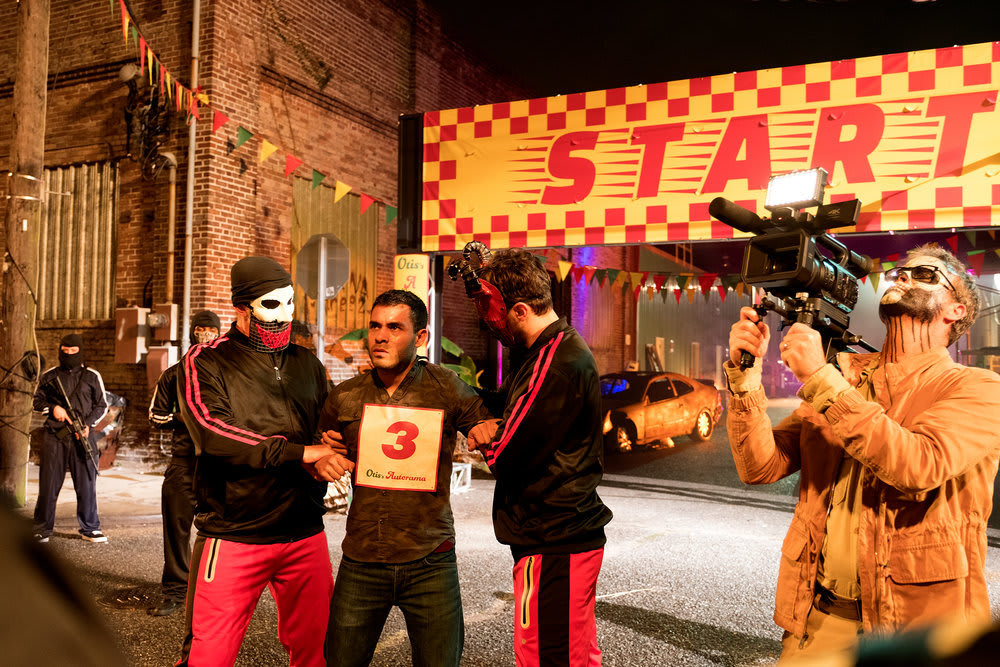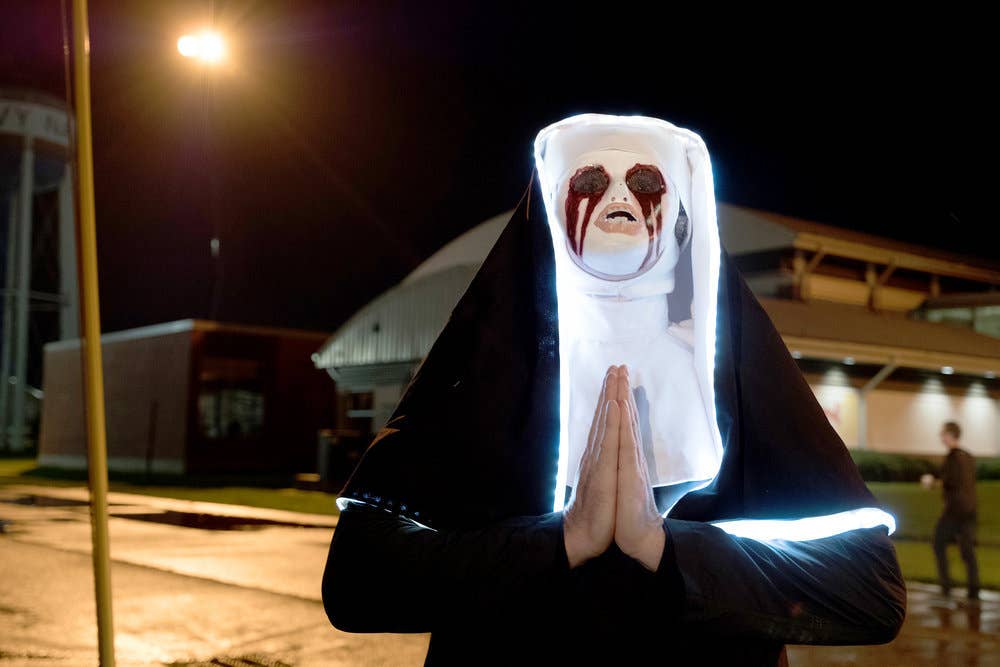
Being an admitted fan of Blumhouse’s The Purge film series, my interest was piqued when word surfaced that a Purge television series was set to arrive this fall. The fact that it was on USA gave me some pause, considering how violent those Purge films can be. Hell, even releasing the series roughly 90 days after the fourth film in the franchise—The First Purge—hit theaters was intriguing, given that it would be set firmly in the universe of the films, capitalizing on what Marvel’s tried to do with their television and film products. After watching the first two episodes, however, this Purge fan has a question: Is this series even necessary?
[Ed. note: Mild spoilers for The Purge television series and film franchise follow. Read at your own risk.]
With these Purge films, Blumhouse and creator James DeMonaco (who directed and wrote the first three Purge films, wrote and produced The First Purge, and maintains writing and executive producer credits on The Purge TV series) cultivated a truly American horror story. The first film thrust viewers into a dystopian future run by the New Founding Fathers of America (NFFA). America ends up being virtually crime-free due to an annual Purge, aka one 12-hour period when all crime (“including murder,” which is always emphasized) is legal.
That 2013 home-invasion horror film found Ethan Hawke defending his family on this one fateful night, and it teased something that was brought further to light in subsequent films: The NFFA is using the Purge as a form of cleansing of the American population, be it for classist or racist reasons. Living under the current regime run by Donald Trump (or, as Spike Lee calls him, “Agent Orange”), many feel that we aren’t that far from a Purge-like future. If there was any doubt of these undertones, the series’ eventual dominant story, you’d need to look no further than The First Purge, which properly showcased how the elite, rich, white NFFA specifically targeted black and brown people during the inaugural Purge, just to showcase how effective this new regime is.
USA’s The Purge television show doesn’t have a definitive time frame; it definitely takes place somewhere in the middle of The First Purge and The Purge: Election Year, where the Purge was actually disbanded. We know the annual Purge has been going on for a while because, at times, we hear people speaking on “Purge parties” of the past and how this year’s Purge is set to be the deadliest one yet. We do get to see intriguing additions to the America that the Purge lives in; there are hired guns who will take money to purge for you (they even livestream their murder spree). There’s also one live show, where citizens are forced to run a violent “gauntlet” for the world to see. And there’s a cult whose true believers hop on a blue bus and drive around the city, giving themselves up to be purged. It’s no different than the multitude of ways that the movies have shown purgers upping the ante for each year’s celebration. And that’s the problem.

We’re seeing all sides of the Purge in the series. There’s the ritzy upper crust who make power moves and pay to stay protected. There’s one guy looking to find his sister (and hopefully stop her from getting purged with the blue-bus purgees). Another woman has to work on Purge night, but has someone going to take care of her problem for her. All the while we see one guy getting his lunch ready for a proper night of destruction. With these main storylines playing out during this 10-episode series set during one 12-hour Purge—all re-emphasizing what the films have done—is there truly a point? It sure doesn’t feel like it.
One would hope that, given a longer, 10-hour format, we could go deeper into the societal issues that the Purge films comment on. What we’re actually given are smaller stories leading to the same result: The rich get richer by staying murderous, and the poor just find ways to survive. The films have literally shown us the alpha and omega of the Purge; if the television shows aren’t highlighting these issues in a different way, then what the hell are we doing?
You’d hope that, at the very least, this was dynamic television, not saccharine MurderDeathKill fantasies for people who close their eyes during the scary parts of films. At times this show feels like it was created by people who didn’t even see the films, but just watched the trailers.
There are also different questions that come up during this series. For example, while you’d assume that people amassed weapons year-round in hopes of getting their kills during Purge Night, what’s the legal situation on people being captured and cuffed before the Purge begins? And is there really a one-to-one comparison of serial killers being the forefathers of Purging before the NFFA made it legal? I get it, but most serial killers are fucked-up individuals; it’s not like Charles Manson or the Son of Sam were bettering society with their murders. And speaking of murder, the fact that this is a USA series means that much of the up-front gore and violence happens offscreen. That worked back in the day for films like The Texas Chain Saw Massacre, but it gets old when every time someone is hacked to death, we only see the shadows or hear the screams. I may sound like a bloodthirsty viewer, but this series looks and feels like a sanitized television version of an ultraviolent and ultra-profitable film series.
Maybe that’s the point, though. You can’t hate on the attempt to expand the film franchise onto the small screen, especially in a world where everything from the Marvel Comics spectrum to the Godzilla and King Kong movies are being turned into massive shared universes. What’s not OK are heavy-handed, reduced-fat versions of pop culture phenomenons being thrown on cable TV.

There’s a moment when the live broadcasted “gauntlet” murder show is playing (scored with horrible rap music, BTW) and one rich, old white dude is excitedly looking at the screen while attending a Purge party. While it wasn’t the intention, he had the same look on his face that someone’s grandfather might have when finally getting into a viral craze or moment that has passed. It feels like the perfect description of this series, which is also the show’s biggest problem. Instead of an attempt at something new, which would no doubt help the franchise continue to grow and evolve, we’re given a sophomoric, softcore take on a successful, sadistic franchise. With that being four films in, the TV series shouldn’t be poorly walking in the footsteps of what we’ve seen; it should, at the very least, provide something new or different to the mythos of the Purge.
Unless The Purge can pick up the pieces and stick the landing, one hopes that the series ends up offing itself to close out Purge night once and for all.

